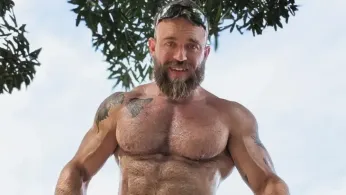
Sep 11
Muscle Bear Rock Biggs is a Beefy Beauty
Andrea Marks Joseph READ TIME: 15 MIN.
Fitness trainer, bodybuilder, and musclebear Colin Wealleans aka Rock Biggs is huge, hard, and incredibly hot. Whether he’s inspiring us to get into the gym and beef up, or looking droolworthy at the beach, we will never get enough of this beefy beaut!
Bodybuilder Biggs modeling this ‘camo pixel viper’ bodysuit is a dream. Pulling the neckline down to reveal more of his sexy pecs and chest hair is a generous gesture by a gorgeous man!
We love a chest close-up —and how could we not, when the chest looks this good! Rock Biggs’ firm pecs, butterfly tattoo, and perky, pierced nipple all shine here.
“Get beefy legs and a grab-able ass, with a commanding back and of course a big pair of juicy t*ts.” If you’re looking for a muscle bear training program, Biggs is your guy!
This brilliant swimming pool video is a stunning sight, both underwater and above it. Rock Biggs is serving beefy merman (the comments suggest ‘merbear’ and ‘bearmaid’) and we’re so into it!
The combination of Biggs’ striking full beard, tiny glasses, nipple ring, and chest hair has us feeling breathless. Wherever Professor Biggs has gone on holiday, we want to be there!
Biggs is large and in charge here, posing in a leather harness and matching jock strap, his beautifully-tattooed biceps bulging.
Even when rocking a full-coverage leather fit, the magnitude of Biggs’ body cannot be hidden. In this skintight uniform look by a fetish leathermaker, Rock Biggs has our hearts racing.






